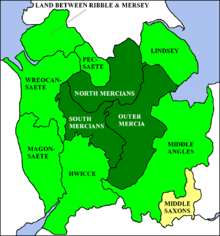Mercia
Mercia [ mɜː (ɹ) siə ] (Old English: mierce, myrce ), German Mercia , Merzien or Südhumbrien (since the south of the Humber . See Northumbria ), was one of the seven Anglo-Saxon kingdoms during Heptarchy . The term itself is derived from the Germanic term for "border area" (cf. in the German mark ). The landscape was probably named after its location to the adjoining Celtic- British kingdoms that were pushed back to the west in the 6th century , or it was seen as the borderland between Northumbria and southern Humbria.
history
Origins
The origin of the Kingdom of Mercia can only be roughly sketched due to the scarce sources. In the 6th century fishing groups immigrated to the region. Icel , the legendary founder of the Mercian royal dynasty, is said to have lived in the 6th century. Early centers of the kingdom were south of central Trent and were Lichfield , Tamworth and Repton . By the end of the 6th century at the latest, Mercia had established itself as a kingdom after the merging of several ethnic groups (e.g. Tomsæte, Pencersæte).
Rise and Bloom
With the last pagan king Penda (around 630-655) Mercia came into the focus of chroniclers . Penda was a warlike ruler and significantly expanded Mercia's sphere of influence in alliance with Welsh kings such as Cynddylan . Penda fell in 655 fighting Oswiu of Northumbria at the Battle of Winwaed . Thereupon Oswiu himself ruled over Mercia until in the year 658 the mercischen Ealdorms Immin, Eafa and Eadberht revolted against him and with Wulfhere elevated the youngest son Pendas to king Mercias. Wulfhere restored the sovereignty of Mercias and extended the supremacy to the kingdom of Lindsey . At the latest under Æthelred (674 / 675-704) the kingdom of Hwicce was also dependent on Mercia.
Mercia reached the height of his power under Æthelbald (716-757) and Offa (757-796), who called himself rex Angliorum . Under Cenwulf (796–821), Ceolwulf I (821–823) and Beornwulf (823–825), Mercia's influence on the remote “provinces” gradually began to wane.
Decline
The mercian system of government was frozen and could not adapt to the changes. The actual power shifted from the kings and their appointed "officials" to the Ealdormen , which were rooted in the regions and enjoyed the support of the population. In 825 Egbert von Wessex defeated Beornwulf at the Battle of Ellandun and Mercia lost its supremacy in the south of England to the emerging Wessex . Mercia was subsequently limited to its core area. Burgred (852-874), the last independent king of Mercias, was ultimately unable to withstand the repeated attacks of the Vikings and was expelled in 873/874. The Vikings ruled the east of Mercias themselves and set Ceolwulf II (874-879) as a puppet king in the western part. The independence came to an end when the "English Mercia" was administered from around 880 by the Kingdom of Wessex by the Ealdorman Æthelred (around 880–911).
See also
swell
- Beda Venerabilis : Historia ecclesiastica gentis Anglorum , Online in the Medieval Sourcebook (English)
- anonymous: Anglo-Saxon Chronicle , online in Project Gutenberg (English)
literature
- Barbara Yorke : Kings and Kingdoms of early Anglo-Saxon England . Routledge, London / New York 2002, ISBN 978-0-415-16639-3 .
- Lapidge et al. (Ed.): The Blackwell Encyclopaedia of Anglo-Saxon England. Wiley-Blackwell, Oxford et al. a. 2001, ISBN 978-0-631-22492-1 .
- Michelle P. Brown, Carol Ann Farr (Eds.): Mercia: An Anglo-Saxon Kingdom In Europe . Continuum, 2005, ISBN 978-0-8264-7765-1 .
- Ian W. Walker: Mercia and the Making of England. Sutton, Stroud 2000, ISBN 0-7509-2131-5 .
- DP Kirby: The Earliest English Kings. Routledge, 2000, ISBN 978-0-415-24211-0 .
Remarks
- ↑ Harald Kleinschmidt: The Anglo-Saxons . CH Beck oHG, Munich 2011, ISBN 978-3-406-62137-6 .
- ^ Barbara Yorke: Kings and Kingdoms of early Anglo-Saxon England . Routledge, London / New York 2002, ISBN 978-0-415-16639-3 , p. 102.
- ↑ a b c Simon Keynes: Mercia . In: Lapidge et al. (Ed.): The Blackwell Encyclopaedia of Anglo-Saxon England. Wiley-Blackwell, Oxford et al. a. 2001, ISBN 978-0-631-22492-1 , pp. 306-308.
- ^ Barbara Yorke: Kings and Kingdoms of early Anglo-Saxon England . Routledge, London / New York 2002, ISBN 978-0-415-16639-3 , pp. 101-102.
- ^ Barbara Yorke: Kings and Kingdoms of early Anglo-Saxon England . Routledge, London / New York 2002, ISBN 978-0-415-16639-3 , pp. 103-105.
- ^ Philip Holdsworth: Oswiu . In: Lapidge et al. (Ed.): The Blackwell Encyclopaedia of Anglo-Saxon England . Wiley-Blackwell, Oxford et al. a. 2001, ISBN 978-0-631-22492-1 , p. 349.
- ↑ Simon Keynes: Rulers of the Hwicce . In: Lapidge et al. (Ed.): The Blackwell Encyclopaedia of Anglo-Saxon England . Wiley-Blackwell, Oxford et al. a. 2001, ISBN 978-0-631-22492-1 , p. 507.
- ^ Simon Keynes: Kings of the Mercians . In: Lapidge et al. (Ed.): The Blackwell Encyclopaedia of Anglo-Saxon England. Wiley-Blackwell, Oxford et al. a. 2001, ISBN 978-0-631-22492-1 , pp. 505-508.
